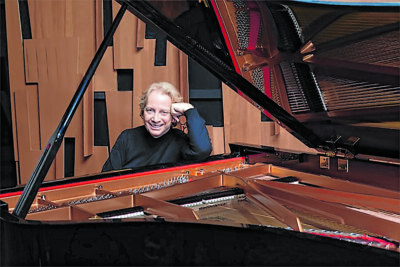A look inside school reopening plans within higher education
Colleges, just like younger grades, have started school once again. From the protocols to the new classroom procedures, things are looking a whole lot different than in years past. As enacted by Governor Andrew Cuomo, there are official New York State guidelines that colleges and universities must follow in order to be able to reopen. Adelphi University, Hofstra University and Molloy College are three institutions that have specified plans in place in order to have a safe reopening and school year.
Adelphi University reopened on Monday, August 31 with students opting for either coming back to campus or staying virtual. Students who opted for in-person classes returned to campus a week before the start date. Adelphi is also offering students the hybrid model, which is a combination of in-person and virtual classes. Vice president for student affairs and dean of students, R. Sentwali Bakari said the process of reopening Adelphi took a village.
“We developed numerous different committees that took a look at what it would take and what’s involved in a restart,” he said. “We formed a health and safety committee, the resident life committee and a return to work committee. We developed a student life return and athletics [also]. That was the start, led by our president Dr. Christine Riordan and our executive leadership team, which I’m a part of. As a result of that, we started developing our guides and expectations and what’s entailed in terms of a campus restart.”
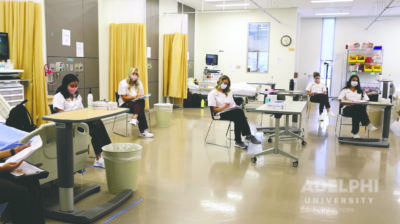
According to Bakari, Adelphi University created files that help make the transition into the new school year a bit easier. One of them is a master restart document that is accessible to anyone on the school’s website.
“That document made reference to safely and responsibly opening the campus according to state health requirements,” he said. “Of course it talked about daily health and symptom screening, hygiene and handwashing for the campus, as well as social distancing and restrictions on gathering in large groups.”
Adelphi University also has a technology-driven way to be safe on campus. Bakari said the university has an app that can be downloaded to anyone’s mobile device.
“We require students, staff and all employees, anytime they come to campus to complete the app,” he said. “It’s a health screening app that asks a number of questions about how they feel and were they around anyone who tested positive. They need to be cleared to come to campus.”
Students are what make up a new program called Health and Wellness Ambassadors. Michelle Glover-Brown, co-coordinator of the program, said there are specific things that the students must do as part of the job.
“If someone needs a face mask, they [the students] are there to give them one,” she said. “They are walking the campus to make sure everyone is maintaining good social distancing. They check our hand sanitizing stations, they do surveillance to make sure it’s full and they also check the stock of our PPE equipment and other items are available if someone needs.”
The program is run through the university’s environmental health and safety office. As of right now, only 13 students make up the program and are paid part-time. Glover-Brown encourages all students to join the program.
“I’m always open to volunteers in the office of environmental health and safety,” she said. “There are some students that are looking for different on campus internships. If they wanted to do something within this program to help them in terms of graduation, I’d work out that arrangement with them. There are many ways that our students can be involved.”
Bakari is optimistic about the academic future of Adelphi as it continues to follow through on its restart plan.
“I get the feeling as we move forward, we will be taking a moment to see how creative we can be,” he said. “I think initially, people are looking at all of the remote education and we discovered that it works really well for some people. I think this is an opportunity for institutions to think of creative ways to deliver education moving forward.”
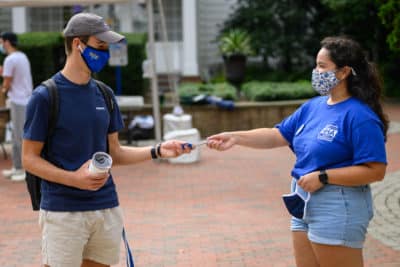
Hofstra University reopened its doors to students and staff on Monday, Aug. 24. Dr. Sharon Phillips, associate professor of community health and health sciences, said the university has a specialized program that is helping to make the reopening process easier and more comfortable for students who are returning to campus.
”It’s called Hofstra Health Ambassadors,” she said. “It’s a peer-to-peer health education program. The idea is that peers are helping to remind peers [in this particular instance] to follow the safest and best practices related to COVID-19.”
As director of the Hofstra Health Ambassadors program, Phillips said the initial idea was created by the public healthy faculty and brought to the university’s public relations department. After that step, she said it was approved by the president and the board of trustees.
In order for the students to be prepared for the ambassadorship, each student had to complete a step-by-step process before the program could officially begin. She said the program preparation involved many moving parts.
“We had safe start training, which looked at specifically what Hofstra’s doing, so that they would be able to answer questions that people ask them about where they can be tested on campus and what the rules and regulations are on Hofstra’s campus,” Phillips said. “We also had COVID-19 training. The training was actually done by a physician. We have three graduate assistants who are assisting me in running the program. One of them is actually a physician and a Master’s of public health student. She did a PowerPoint on everything we know about COVID-19. Public safety [also] came in and did a training around conflict resolution.”
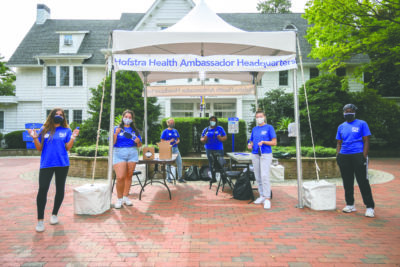 There are specific responsibilities that come with being a health ambassador. According to Phillips, the students have a designated place on campus where they are visible to those walking around the university.
There are specific responsibilities that come with being a health ambassador. According to Phillips, the students have a designated place on campus where they are visible to those walking around the university.
“We have a tent outside in front of Hofstra Hall,” she said. “That is also in front of the unispan when students pour out of the library. That’s our headquarters. That’s where we keep informational booklets and hand sanitizer as well as masks that we can hand out. We try to keep that staffed with at least two health ambassadors at a time. The other health ambassadors come and stand outside. They stand in front of academic buildings and outside the tents on campus we have set up. In the evenings, they’ll stand in front of the dorms. They’re also standing outside and working some of the events and work movie nights. The health ambassadors are at those events to remind people to socially distance and to hand out masks because people forget their masks.”
Currently, the program is made up of 70 undergraduate and graduate students. The program has 60 paid positions. However, Phillips said any student with a desire to join the program can volunteer or use the program as a way to get internship credit.
“We’re looking for students who are interested in helping to shift the culture to a safe culture,” she said. “We’re looking for students who show leadership in that area, who are friendly and are ready to engage with other students.”
Besides the Hofstra Health Ambassadors program, the university also has extensive plans to improve the campus. Karla Schuster, vice president of university relations at Hofstra, said the university has made investments to help combat COVID-19.
“[Among them] installing sophisticated lecture capture technology in many classrooms to improve the remote learning experience, taking numerous actions to improve building ventilation, purchasing cutting-edge electro-static disinfectant sprayers, erecting tents on campus to provide students with a safe, outdoor way to socialize, and providing every member of the campus community with a supply of reusable masks,” she said. “In addition, we instituted a wide range of health and safety protocols, such as requiring masks, physical distancing and filling out a daily online health screening before coming to campus. These protocols have been included in the student Code of Conduct. At the same time, the university has launched a multi-platform educational campaign to encourage the campus community to follow safe practices and discourage them from high-risk activities, such as large gatherings. We have also created many more online or hybrid classes to moderate the density of in-person offerings on campus.”
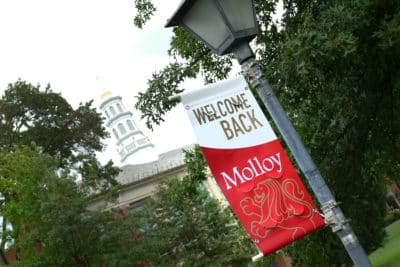
Molloy College has maintained remote instruction since the beginning of the pandemic. As a result, the college has specific reopening procedures in order to stay safe. The institution, founded by the Sisters of St. Dominic in 1955, reopened for classes on Tuesday, Sept. 8.
Janine Biscari, vice president for student affairs at Molloy College, said the college is doing everything they possibly can to ensure all students have a safe campus to come to.
“We’ve been planning since February when everything became news about the coronavirus,” she said. “Our president at the time, Dr. Bogner put together a task force to handle some immediate decisions that needed to be made relating to closing and then transition that task force, to getting prepared for the restart of our physical locations.”
Everyone on the task force team has a different set of responsibilities. As chair of the task force, Biscari said her main role was to be in charge of operations.
“My main responsibility was making sure we were able to operationalize everything that was in our plan,” she said. “A lot of it was time spent walking [around] the buildings and walking our locations, making sure that we were posting the appropriate signage.”
As a collective, she said the task force spent a lot of time implementing concepts that would protect everyone returning to campus.
“We’ve implemented temperature kiosks at all of our locations,” Biscari said. “Making sure that all of those were up and running. Working with some other members of the community to make sure we had protocols and directions at our temperature kiosks, in case someone does come with a temperature. Making sure that the physical setups were all ready to go, especially with social distancing. We wanted to make sure that everything we wrote about we were able to do. A bunch of us have spent the last few months making sure what we wrote down matches what we are doing.”
The other task force members include Matt Albanese, Director of Compliance; Diane Fornieri, Chief of Staff; Ed Hennessey, Employee Relations and Engagement Specialist; Barbara Schmidt, AVP for Academic Affairs; Michael Torres, VP for Technology and Institutional Effectiveness; Susan Williams, VP for Finance.
Due to state guidelines being updated, colleges and universities are making adjustments when required to. She said Molloy College is in the middle of instituting other setups to increase protection for everyone that are in buildings on campus.
“We are in the process of providing air purification units to any space on campus that has no windows for increased air flow,” Biscari said. “That’s still in progress and we are employing those units as we receive them.”
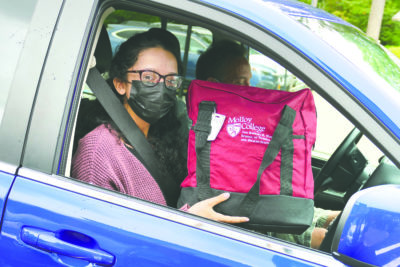 For any Molloy student who is going through hard times due to the pandemic, there are ways for students to receive the assistance they are looking for. Biscari said students have access to multiple resources on campus.
For any Molloy student who is going through hard times due to the pandemic, there are ways for students to receive the assistance they are looking for. Biscari said students have access to multiple resources on campus.
“Academic affairs is providing support,” she said. “All of our services are available in-person, at the college and remotely. If a student isn’t necessarily taking a face-to-face class, they can still utilize the counseling center, the career center and the writing center. All of those departments that provide direct student support have options. You can do in-person or virtual.”
“I have had weekly open door sessions on Zoom with students,” Biscari said. “I had close to 10 open forums for parents and students during the summer to update them and have them ask questions. It’s been a very open transparent process.”
In preparation for the fall reopening, Molloy College created a social media campaign called #MaskUpMolloy aimed at making students aware of COVID-19 procedures and protocols. Biscari said Molloy College is taking all the necessary measures to ensure everyone’s safety.
“Our main priority since February has been to promote the safety and well-being of every single person that comes to campus,” she said. “That has been our guiding principle throughout all of our planning, and it continues to be everyday. I can confidently say that our attempt has been to go above and beyond anything that the state has issued as a minimum requirement, in an effort to let people feel safe.”
To learn more about Adelphi’s Health and Wellness Ambassador program, email healthandwellness@adelphi.edu
To learn more about Adelphi’s restart plan, visit www.adelphi.edu/restart/
To learn more about the Hofstra Health Ambassadors program, follow @hofstrahealthambassadors on Instagram.
To learn more about Hofstra’s reopening plans, visit www.hofstra.edu/safe-start/index.html
To learn more about Molloy’s reopening plans, visit www.molloy.edu/molloy-life/student-health-and-wellness/coronavirus-updates







